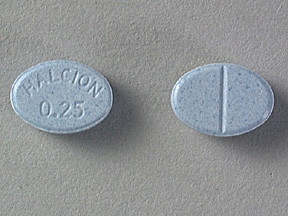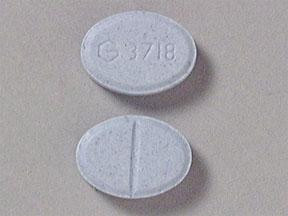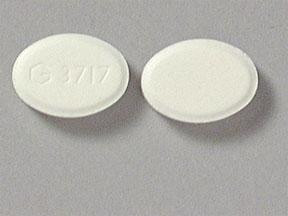TRIAZOLAM - ORAL
PHONETIC PRONUNCIATION: (tri-AH-zoe-lam)
COMMON BRAND NAME(S): Halcion
GENERIC NAME(S): triazolam
Uses
USES: This medication is used to treat a certain sleep problem (insomnia). It may help you fall asleep faster, stay asleep longer, and lessen how often you wake up during the night, so you can get a better night's rest. Triazolam belongs to a class of drugs called sedative-hypnotics. It acts on your brain to produce a calming effect. Use of this medication is usually limited to short treatment periods of 1 to 2 weeks or less. If your insomnia continues for a longer time, talk to your doctor to see if you need other treatment.
How to use TRIAZOLAM - ORAL
HOW TO USE: Read the Medication Guide provided by your pharmacist before you start using triazolam and each time you get a refill. If you have any questions, ask your doctor or pharmacist. Take this medication by mouth with or without food as directed by your doctor, usually just before you get into bed. The dosage is based on your medical condition, age, and response to treatment. Although unlikely, this drug can rarely cause temporary short-term memory loss. To lessen the chance of this, do not take a dose of this drug unless you have time for a full night's sleep of at least 7 to 8 hours. If you have to wake up before that, you may have some memory loss. Avoid eating grapefruit or drinking grapefruit juice while using this medication unless your doctor or pharmacist says you may do so safely. Grapefruit can increase the chance of side effects with this medicine. Ask your doctor or pharmacist for more details. This medication may cause withdrawal reactions, especially if it has been used regularly for a long time or in high doses. In such cases, withdrawal symptoms (such as nausea, vomiting, flushing, stomach cramps, nervousness, shakiness) may occur if you suddenly stop using this medication. To prevent withdrawal reactions, your doctor may reduce your dose gradually. Consult your doctor or pharmacist for more details, and report any withdrawal reactions right away. When this medication is used for a long time, it may not work as well. Talk with your doctor if this medication stops working well. Though it helps many people, this medication may sometimes cause addiction. This risk may be higher if you have a substance use disorder (such as overuse of or addiction to drugs/alcohol). Take this medication exactly as prescribed to lower the risk of addiction. Ask your doctor or pharmacist for more details. Tell your doctor if your condition persists after 7 to 10 days, or if it worsens. You may have trouble sleeping the first few nights after you stop taking this medication. This is called rebound insomnia and is normal. It will usually go away after 1 or 2 nights. If this effect continues, contact your doctor.
Side Effects
Precautions
Interactions
Overdose
Images
Reviews
Faq for TRIAZOLAM - ORAL
Triazolam is a medication used to treat insomnia, a sleep disorder characterized by difficulty falling asleep or staying asleep.
Triazolam belongs to a class of drugs called benzodiazepines, which act on the brain and nerves to produce a calming effect. It enhances the effects of a natural chemical in the body called GABA, which helps to reduce brain activity and induce sleep.
The common side effects of Triazolam include drowsiness, dizziness, headache, blurred vision, confusion, nausea, and dry mouth. These side effects are usually mild and go away on their own.
Triazolam has the potential for dependence and addiction if misused or taken in higher doses for prolonged periods. It is important to follow your doctor's instructions and not exceed the prescribed dosage.
It is not recommended to drive or operate machinery while taking Triazolam, as it can impair your thinking and reaction time. It is best to wait until you are fully alert before engaging in any activities that require mental alertness.
Triazolam has a relatively short half-life of about 2-3 hours. However, it may take longer for the drug to be completely eliminated from your body. It is best to consult with your doctor or pharmacist for more specific information.
It is not advised to consume alcohol while taking Triazolam, as it can increase the risk of severe drowsiness, dizziness, and impaired coordination. Combining alcohol with Triazolam can also potentially worsen the side effects of the medication.
Triazolam can interact with certain medications, including other sedatives, antifungal drugs, antidepressants, and antiepileptic medications. It is important to inform your doctor about all the medications, supplements, and herbal products you are currently taking to avoid any potential drug interactions.
Triazolam should be used with caution in elderly patients, as they may be more sensitive to the effects of the medication. It is important to start with a lower dosage and closely monitor for any adverse effects or excessive sedation.
Warning
WARNING: Taking triazolam with opioid medications (such as codeine, hydrocodone) may increase your risk of very serious side effects, including death. To lower your risk, your doctor should have you take the smallest dose of triazolam that works, and take it for the shortest possible time. Get medical help right away if any of these very serious side effects occur: slow/shallow breathing, unusual lightheadedness, severe drowsiness/dizziness, difficulty waking up.
Disclaimer
IMPORTANT: HOW TO USE THIS INFORMATION: This is a summary and does NOT have all possible information about this product. This information does not assure that this product is safe, effective, or appropriate for you. This information is not individual medical advice and does not substitute for the advice of your health care professional. Always ask your health care professional for complete information about this product and your specific health needs.



No Reviews Yet